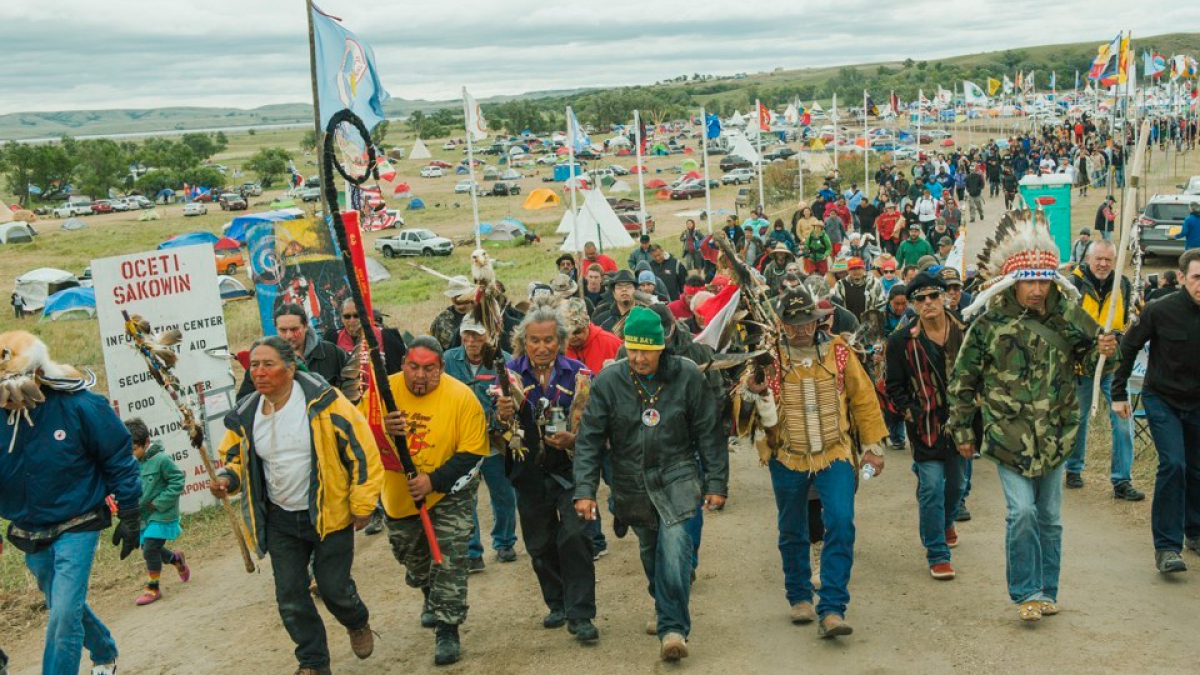Standing Rock and Palestine: The Struggle for Justice is One

Last week, I joined several hundred protesters in a sit-in in front of the Army Corps of Engineers' Headquarters in Washington, DC. We were protesting the construction of the Dakota Access Pipeline designed to daily transport over 500 thousand barrels of fracked oil southward to be refined.
The DC protest was part of an international day of solidarity with efforts led by Native Americans at the Standing Rock Reservation in North Dakota. In all, demonstrations were held in over 300 cities worldwide. On one level, the issues involved are presented as complicated matters of economics, geography, and law. On a more basic level, however, it is a simple question of justice.
Proponents of the pipeline argue that fracked oil is helping to make America energy independent. They maintain that the route they have chosen for the pipeline is the most cost-effective one and they insist that the government has the right to claim the land along the route.
The Sioux tribe at the Standing Rock Reservation, on the other hand, counter that the pipeline poses a threat to their main water supply. One leak would contaminate their water impacting their survival. They also argue that the land set aside for the line contains many of their sacred sites and burial grounds—some of which have already been violated in construction. And they note that while the US government claims the land through which the pipeline is to be built, this claim is the result of violations of treaties the US made with their tribe over a century and a half ago. They were dispossessed of their lands then, and the dispossession continues.
Because it raises such fundamental issues of justice and history, Standing Rock has become the epicenter for a protest movement that has drawn thousands of Native Americans from across the US and won the support of indigenous peoples around the globe. The protesters who refer to themselves as "Water Protectors" have engaged in massive and peaceful acts of civil disobedience only to be met with a heavily militarized police forces using rubber bullets, tear gas, and power hoses spraying demonstrators with water in below freezing weather. The resulting scenes of violence have been shocking.
I have been proud of the many Palestinian Americans who have joined the protests in North Dakota and thrilled to see Palestinians in the occupied lands demonstrate their solidarity with Standing Rock. It is natural that they do so in recognition of their shared narrative.
The Zionist settlers who came to Palestine in the 1920's recognized this. They sometimes referred to the Palestinian Arabs whom they encountered as "Red Indians"—savages to be defeated, obstacles to their ambitions who had to be removed in order to pave the way for the realization of their dream of creating a Jewish enterprise in Palestine.
Instead of rejecting this identification with the indigenous peoples of North America, Palestinians embraced it. Yasser Arafat often spoke of the lessons learned from this shared history saying that his people were fighting so that their fate would not be the same. And the "national poet of Palestine", Mahmoud Darwish, carried this identification further in his poem "Speech of the Red Indian" in which he wrote—speaking to the foreign invaders—"You who come from beyond the sea, bent on war: don't cut down the tree of our name; don't gallop your flaming horses across the open plain...Our pastures are sacred, our spirits inspired. The stars are luminous words where our fable is legible from beginning to end".
The parallels, in the plight of these two peoples, remain. This was made evident in two recent UN agency reports. While the Standing Rock protests are focused on protecting the tribe's water supply and stopping the desecration of their burial sites: UNESCO passed a resolution last month condemning, among other things, the destruction of Palestinian cemeteries in Jerusalem (one of which became the site of "A Museum of Tolerance" and another to create a public space which, adding insult to injury, recently hosted an Israeli wine festival); and an alarming UN report which noted that only 10% of Palestinians in Gaza have access to clean water.
When I spoke at the solidarity rally that accompanied the sit-in, I spoke of this shared history of dispossession and dispersal, noting that just as it is imperative that we, as Americans, recognize that our nation was born in original sin—the crime of ethnic cleansing committed against the indigenous people we found on this land—we must acknowledge that this was true of Israel, as well. I know that it's not what they mean, but it is what I hear when American and Israeli leaders speak of "our shared values".
And so as an American, and especially as an Arab American, I am proud to stand with the Standing Rock Sioux because the struggle for justice is one and is playing out daily in North Dakota and across the occupied Palestinian lands.
Topics: Injustice, Native Americans, Occupy Movement, Palestine, Social Justice
Views: 1289
Related Suggestions

















